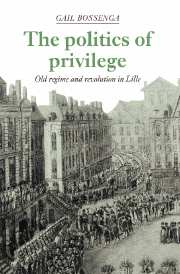Book contents
- Frontmatter
- Contents
- List of figure and tables
- Preface
- List of abbreviations
- 1 Monarchy, privilege and revolution: the problem and setting
- 2 State finance and local privileges
- 3 Corps, bureaucracy and citizenship: the case of the Bureaux des Finances
- 4 The excluded nobility and political representation
- 5 A nation of equals: the demands of the Third Estate
- 6 Uses of a regulated economy: the state against itself
- 7 Corporate privilege and the bourgeoisie
- 8 The abolition of the guilds
- 9 The corporate heritage and the well-ordered state
- 10 Conclusion
- Notes
- Bibliography
- Index
3 - Corps, bureaucracy and citizenship: the case of the Bureaux des Finances
Published online by Cambridge University Press: 01 October 2009
- Frontmatter
- Contents
- List of figure and tables
- Preface
- List of abbreviations
- 1 Monarchy, privilege and revolution: the problem and setting
- 2 State finance and local privileges
- 3 Corps, bureaucracy and citizenship: the case of the Bureaux des Finances
- 4 The excluded nobility and political representation
- 5 A nation of equals: the demands of the Third Estate
- 6 Uses of a regulated economy: the state against itself
- 7 Corporate privilege and the bourgeoisie
- 8 The abolition of the guilds
- 9 The corporate heritage and the well-ordered state
- 10 Conclusion
- Notes
- Bibliography
- Index
Summary
In the eighteenth century, the Bureaux des Finances formed one of the many apparently useless collections of corps that lingered on and on for no good reason and hopelessly cluttered up the old regime with their pretensions and inefficiencies. Before the Revolution, there were twentynine of these extraordinary judicial courts, which had originally been granted jurisdiction over matters concerning the royal domain. In the great judicial reforms of May 1788 the Keeper of the Seals, Lamoignon, decided to abolish the Bureaux along with a number of other expendable and seemingly moribund courts. The measure, like so many other attempts to rationalize the old regime, not only failed, but helped to galvanize the privileged elite into overt opposition to royal “despotism.” Yet, despite its battles against royal arbitrariness, the privileged elite neither developed a unified opposition, nor advanced a successful program of reform of its own. When the Revolution came, the cause of privilege collapsed without effective resistance, and, according to some scholars, it was members of the privileged elite itself who helped to sound its death knell. How might this combination of failed royal reform, politicization, revolution, and ideological division within the elite be explained? A look at the relationship of Lille's Bureau des Finances both to the monarchy and to other Bureaux across France helps to illuminate these issues.
Before its annexation to France, Lille's most prestigious court had been the Chambre des Comptes established by the dukes of Burgundy in 1385 to audit accounts and hear lawsuits concerning revenues attached to the old ducal domain. After French armies conquered Lille in 1667, the old Burgundian court was moved to Bruges, but Louis XIV did not immediately replace it.
- Type
- Chapter
- Information
- The Politics of PrivilegeOld Regime and Revolution in Lille, pp. 47 - 69Publisher: Cambridge University PressPrint publication year: 1991



